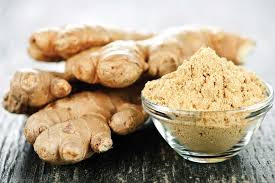Ginger is consumed worldwide as spice, flavoring agent, garnish,
medicine, and food preservative and is used either fresh, in a fresh paste, or
dry, in a dry powder. Fresh ginger can be substituted for dried ground ginger,
although the flavors of fresh and dried ginger are somewhat different.
Powdered dry ginger is typically used as a flavoring for recipes such as
gingerbread, cookies, crackers and cakes, ginger ale, and beer. The fragrance
of ginger is penetrating and aromatic. It tastes spicy, hot, and biting and is an
integral part of almost all the cuisines of the world. The pungent, spicy
sweetness of ginger adds a unique taste to many recipes ranging from sweet
to savory.
In the subcontinents (India and Pakistan) ginger is called Adrak(local
name) and is an essential ingredient of many dishes. Fresh ginger is one of
the main spices used for making pulse, vegetablecurries and meat
preparations. Fresh as well as dried ginger is used to spice tea and coffee,
especially in winter. In Burma, it is consumed as a salad dish called Gyinthot, which consists of shredded ginger preserved in oil, and a variety of nuts
and seeds. In Indonesia, a beverage called wedangjahe is made from ginger
and palm sugar. In the Philippines, it is brewed into a tea called salabat. In
Vietnam, the fresh finely chopped leaves can also be added to shrimp-andyam soup (canhkhoaimỡ) as a top garnish and spice to add a much subtler
flavor of ginger than the chopped root.
In China, sliced or whole ginger is
often paired with savory dishes such as fish, and chopped ginger root is
commonly paired with meat, when it is cooked. In Japan, ginger is pickled to make BeniShoga and gari or grated and used
raw on tofu or noodles. It is also
used to make candy called Shoga no satozuke.
In the traditional
KoreanKimchi, ginger is finely minced and added to the ingredients of the
spicy paste just before the fermenting process (Kim et al, 2005).
In the Caribbean, ginger is a popular spice for cooking and making
drinks such as sorrel, a seasonal drink made during the Christmas season.
Jamaicans make ginger beer both as a carbonated beverage and also fresh in
their homes. Ginger tea is often made from fresh ginger, as well as the
famous regional specialty Jamaican ginger cake.
In Arabic, ginger is called Zanjabil, and in some parts of the Middle
East, ginger powder is used as a spice for coffee and for milk. In the Ivory
Coast, ginger is ground and mixed with orange, pineapple, and lemon to
produce a juice called Nyamanku. Yemenite Jews add ginger powder in
Hawaij, a spice mixture used mostly for soups and coffee (Roden, 1996).

